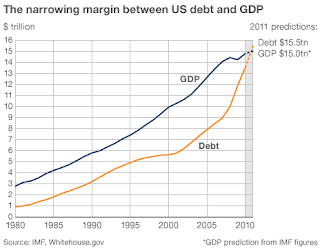The day the US debt was downgraded

5th August 2011 is a historic day when ratings agency Standard and Poors downgraded the US public debt from AAA to AA+ for the first time in modern history. S&P downgrade explanation S&P took this decision to reflect the lack of leadership from US politicians to tackle urgently and decisively the mounting US public debt, which may exceed GDP soon as seen on the chart below. The debate frontier is now between the "spenders" like Paul Krugman - who think the US can recover from the crisis through more public spending which will lead to economic growth necessary to repay debt in the future - and the "deficit hawks" - who highlight that excessive debt raises the risk of a catastrophic default and therefore debt should be reduced urgently. The first view prevailed when a stimulus package was decided on the onset of the recession. The downgrade by S&P, which reflects the increasing riskiness of the US debt, goes in the direction of the second view by sh...
